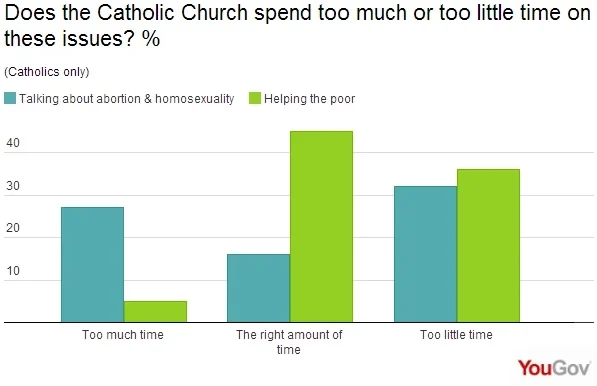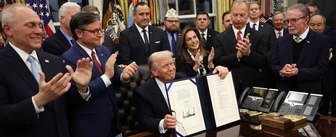Most Americans have favorable views of Pope Francis but many Catholics don't agree with him that the Church spends too much time talking about abortion and homosexuality.
Since his elevation to the Papacy, Pope Francis has made news – by his refusal to live in the Papal apartments, by his willingness to mingle with the public, and most recently by his statements in an interview that the Catholic Church may have become “obsessed” by issues like abortion and homosexuality. In the United States, according to the latest Economist/YouGov Poll, the public may not entirely agree with statements like this, but they do applaud the man and his goals.
In fact, Pope Francis is far more popular than his predecessor, Pope Benedict XVI, and earns praise from both Catholics and non-Catholics. Two in three Catholics have a favorable view of him, as do a majority of all Americans. In fact, non-believers, like atheists and agnostics, are particularly positive towards Pope Francis.
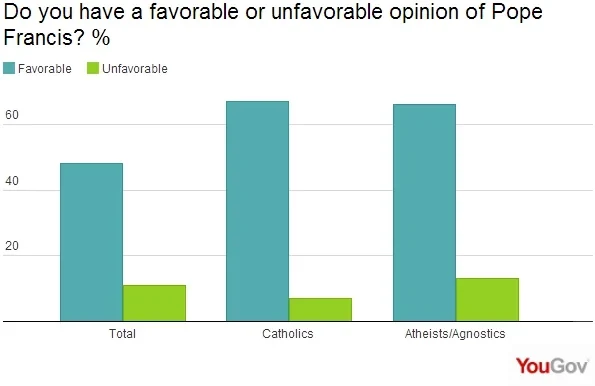
The contrast with Francis’s predecessor, Pope Benedict XVI, who retired from the Papacy earlier this year, is striking. Benedict did not demonstrate the same outgoing personality as Francis, and he spoke out more on doctrinal matters. He also divides both the public overall and American Catholics. Non-believers are very clear about their opinions of Benedict – he gets a six to one negative rating from atheists and agnostics.
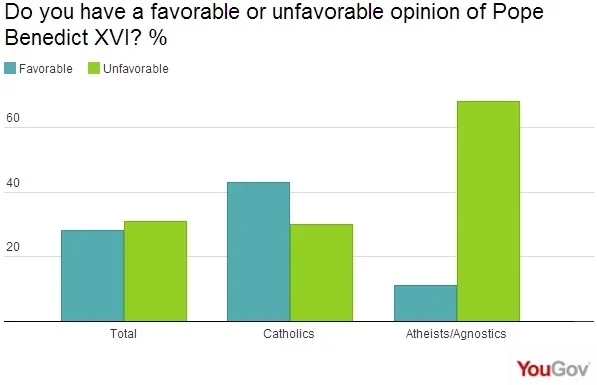
Americans remember Pope John Paul II, the first non-Italian Pope since the sixteenth century, who served longer than all but one other Pope in history, very fondly. John Paul, who will likely be canonized and made a saint next year, has favorable ratings among all Americans and among Catholics that are similar to the positive assessments of Pope Francis, even though John Paul’s views on many social issues were far more conservative than those of the American public – and American Catholics.
American Catholics reflect American, and not necessarily “Catholic,” views on many of those social issues that the current Pope says have been talked about too much by the Church leaders:
- Three in four Catholics say birth control is morally acceptable; only 7% say it is wrong
- Nearly two-thirds say divorce is morally acceptable (11% disagree); 65% think the Catholic Church should allow it
- About half find premarital sex morally acceptable, though 27% do not.
Catholics (and Americans in general) hold more nuanced views on abortion. By 41% to 28%, Catholics find abortion morally wrong. But by 56% to 25%, they believe the Church should permit it --- sometimes.
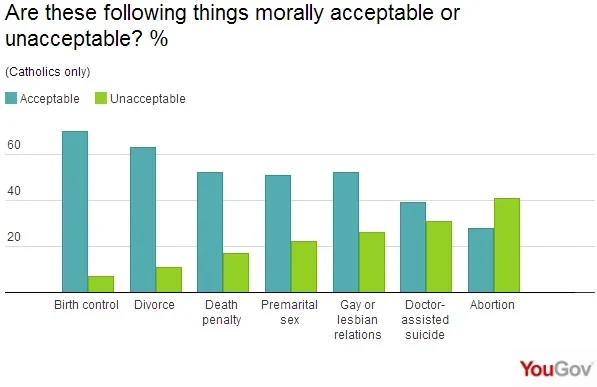
In fact, Protestants and born-again Christians are more opposed to abortion than American Catholics are.
When it comes to homosexuality, the pattern is reversed. Many Catholics don’t see a need for change in the Church’s policy of opposing same-sex marriage. By 49% to 38%, they oppose the Church allowing same-sex unions. But, many Catholics accept gay and lesbian relations as morally acceptable.
Like abortion, homosexuality is an issue where Protestants and born-again Christians are more conservatives than Catholics.
There are some changes in Church administration that many Catholics want to see:
- 68% of Catholics want priests to be allowed to marry
- 62% think women should be allowed to become priests
But there doesn’t seem to be the discontent about the messages promulgated by Church leadership that the Pope referred to in his interview. American Catholics are as likely to think that the Church spends “too little” time talking about social issues like abortion, homosexuality and birth control as they are to say the Church spends “too much” time doing this. And they are divided on whether the Church spends the right amount of time helping the poor. As many say it does as think it is spending too little time doing this.
